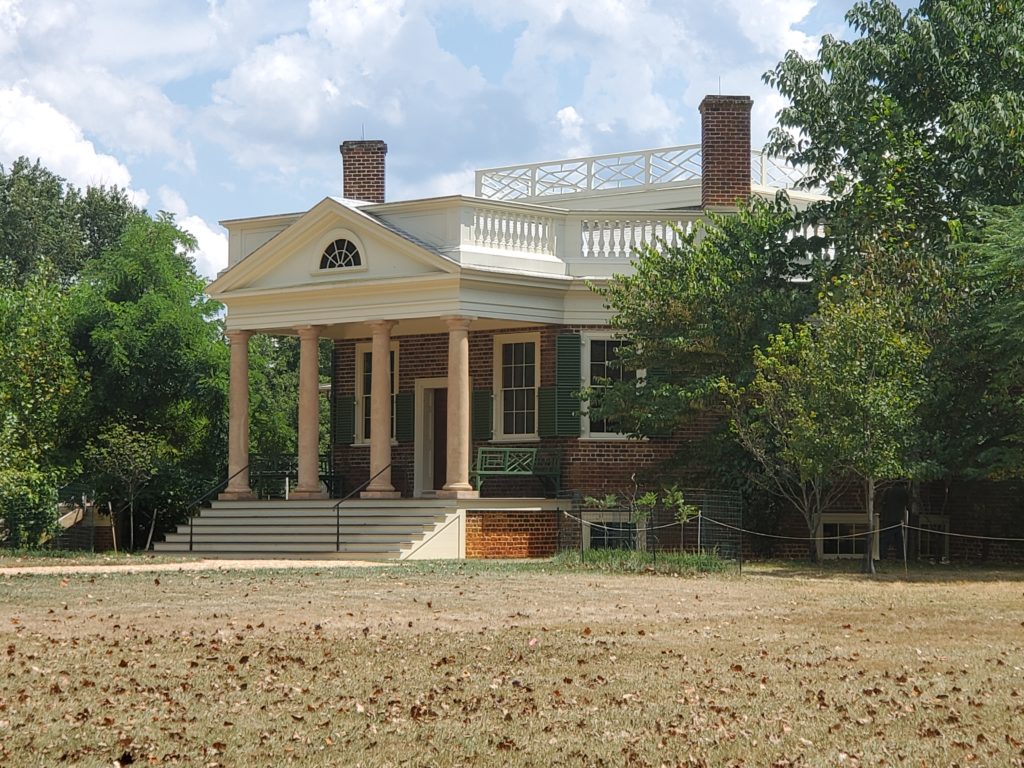Jefferson’s Get-Away Place
On a recent visit to Thomas Jefferson’s second home, Poplar Forest, I was prepared to learn something interesting about Jefferson. I was expecting to feel at home here in this cozy get-away, so comfortable that I could envision hanging out with TJ here. I was not disappointed.

Despite being a public figure, Jefferson was quite the introvert. He apparently loved the quiet space of this home, a respite from the very busy Monticello, where it was common for him to receive dozens and dozens of visitors each day, some invited, most not. The fact that Jefferson needed some downtime was somehow endearing to me since I need downtime in large quantities.
Jefferson reportedly said of Poplar Forest that it was a place to:
“detach myself from public life, which I have never loved, and retire to the bosom of my family, my friends, my farm and my books, which I have always loved.”
That is an understandable sentiment. In fact, many presidents have sought refuge and reclined in the arms of a friendly get-away place. George W. Bush had Crawford, Texas, his father had Kennebunkport. The Kennedys had Hyannis Port, Reagan had his California ranch. And Carter, well he had his peanut farm.
So, Jefferson was in good company in this desire to find a respite from public life. Poplar Forest was it for him, apparently. This compact, octagonal version of the Monticello provides echoes in design and function of its stately cousin in Albemarle County. It was a two-day horse and buggy ride from Monticello to this home in Amherst, Virginia. Now, nestled into the back of an inconspicuous 1980s neighborhood, it bears none of the pomp and circumstance that the approach to Monticello holds. So inconspicuous is it that a visitor could easily envision Jefferson relaxing here, sprawled out on his porch with a glass of wine in his hand. His personal pursuit of happiness was tangible here. Reading, writing his correspondence, tinkering with architecture, envisioning something new for his garden, and enjoying the company of his adult grandchildren, listening to them play music or reading silently along with them in the library.
In retirement, this is where he envisioned the plans for the University of Virginia. He designed the Rotunda and the lawn and the adjacent pavilions. My, am I glad he carved out the time to execute on this most favorite idea of his.
His personal suite was rather well-contained: a bedroom, a sitting area and a private exit to his outdoor privy. This privy was my husband’s favorite feature since it was solid. He pondered on whether this was the origin of that saying about being as solid as a “brick @#$% house.” (And my husband should know one when he sees it!)
This property was only brought back to life in the past few decades. After a series of owners and serious dilapidation, a physician and former UVa student who recognized the historic significance of the property, purchased it in 1984 and created a non-profit to fund the restoration. Despite opening in 1986 for the public to see the “before” state, I had never visited prior to this year. Its restoration is largely complete, with the exception of the basement and functional areas used by slaves. So, while Jefferson relaxed, others worked. The curators of this restoration have justifiably incorporated the stories of slavery at this look into the past.
One such slave was Burwell Colbert, one of the few slaves that accompanied Jefferson on his trips to Poplar Forest. Colbert was one of only five slaves that Jefferson freed upon his death. It is thought that Colbert earned his freedom because he had a skilled trade and could therefore make a living in freedom. Colbert was a painter and glazier and thought to be responsible for the impressive woodwork at Poplar Forest. He was also Jefferson’s personal butler and valet. (I’ve never understood the reason for a valet. I learned to dress myself by the age of four.)
Poplar Forest was charming and distinguished but not powerful and stately like Monticello. And this must be the precise reason why Jefferson felt at home here. He could relax. He could throw open the doors to his library, kick up his feet, and feel the breeze on his face. Jefferson needed a place to recharge, a place far from the madding crowd. But it was not lost on me that his relaxation was afforded on the backs of others.
If I could share an afternoon with Jefferson at his hang-out, I wonder what I’d ask him. I’d surely want to know his thoughts about them ‘Hoos! But well, that would have to wait a few hundred years. I could ask him for thoughts on our democracy. Would it be strong enough to survive an insufferable autocrat? We could marvel at the taste of his homemade wine. And if I had a few glasses, I’d ask him about Mr. Colbert and the prospects for his eventual freedom.



Best line in this blog …. His relaxation was afforded on the backs of others!!
What a time to have lived in ?. Just shows that everyone needs a getaway place ?!!